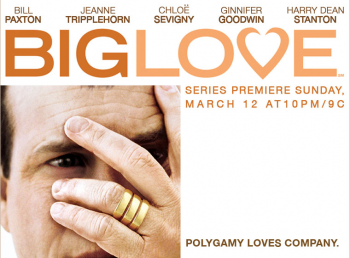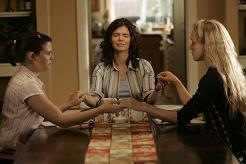Trapped in the Closet: Television Struggles to Represent Religion

The success of HBO’s programming currently rests on a seeming paradox: it offers quality shows — programming that is, by definition, essentially non-formulaic — yet all its series have a distinctive, and shared, HBO touch. As the recent Sunday night coupling of The Sopranos and the new comedy-drama, Big Love again makes clear, the network’s signature programs explore the worlds inhabited by unconventional families, playing with the tensions between their conventional desires and their exceptional ways of life as well as the odd continuities betweenthe normal and the aberrant1. This formula is elastic enough to allow each show to piece together a tapestry of American identity as each series delves into a specific regional culture — from Deadwood’s Old West to Sex and the City’s feminized Manhattan consumer paradise. Each milieu embodies its own distinct but specific American identities, histories and practices — urban immigrant enterprise, rampant consumerism, individualistic practices of law and order, and, of course, religion.
Although religion has played a role in some HBO shows, most notably in The Sopranos, it generally appears incidentally — as part of the culture, less as a form of agency motivating narrative action. Yet given the structural role religion plays in American history, myth and contemporary politics, it is not surprising that HBO’s latest drama would focus on this part of American life. Given the current political climate, it is perhaps to be expected that Big Love tiptoes around this issue and has taken a strangely slow (and largely delicate) approach to narrative in its first two episodes, establishing characters and context in a way that almost bypasses religion, save in terms of its key trope — polygamy. This contrasts with other HBO shows where religion furthers characters and action–whether in the form of Carmella Soprano’s confessional discussions with her priest or Charlotte York’s conversion to Judaism in Sex and the City. Of course, religion is not the central topic of these programs and this, paradoxically, makes it easier and less controversial to give it some narrative agency.
Big Love’s choice of faith also ties in with HBO’s promise of something different and simultaneously American. By focusing on a fringe, fundamentalist polygamist group split off from the LDS (Mormon) Church, Big Love presents a religion that derives from American millenialist tendencies and emphasizes American individualism and non-conformism. It also ties into a backdrop of recent media interest in such groups following the Elizabeth Smart case: ABC’s Dateline and NBC’s Primetime have both produced a series of reports on polygamous fundamentalist Mormons, while similar sects were the subject of Jon Krakauer’s 2003 best-seller, Under the Banner of Heaven. This fascination is clearly related less to the specificities of religious practice and more to questions of sexuality, abuses of power and the strange, covert, backwoods lifestyles these groups inhabit — and the horror they evoke. The conjunction of these cults and Mormonism proper produces a series of strikingly different and telegenic images — the blonde, suburban, upright conventionalism of the established LDS church contrasting with its dark cousin — the polygamous communities hidden in small western towns filled with young wives in Victorian prairie dresses sharing their old, strict husbands.

This is, of course, the visual world that Big Love inhabits. Although its narrative is, as yet, elliptical, the fundamentalist community of Juniper Creek is easily recognized, as is the bright suburban tract where the Bill Hendrickson lives with his three wives and seven children. But the show seems to have problems using its religious premise to explore much beyond the routines of polygamous suburban life (and its dark, Lynchian other in Juniper Creek). Indeed, its explorations of masculinity, sexuality, crime, religion and free enterprise so far owe more to the show’s scheduling next to The Sopranos where similarities between both shows allow these themes to resonate more than they might on their own. Parallels thus arise between Tony Soprano (who handles his anxiety with the help of Prozac) and Bill Hendrickson (who has to take Viagra to satisfy three highly sexual wives), supplementing limited narrative information and allowing viewers to see that, like Tony, Bill is caught between his various families, his desire for a mundane everyday life and the criminal world (here, Juniper Creek) that informs and structures his existence.
Little of this, as yet, is fleshed out in Big Love, however, frustrating its critics and suggesting that there is something about this religious premise that produces caution, preventing the show from diving straight into its narrative conflicts. This unease relates not just to the question of religion more generally, but also to this specific choice of faith. In evading the details of the religion at the show’s distinctive premise, Big Love speaks volumes about the question of religion in American life and the need to treat it with such delicacy. Instead, it has established characters first, forging identification so that its drama does not erupt out of a freak show but out of more subtle conflicts. In so doing, however, HBO has angered some Christian groups who believe that the show is treating a heresy too kindly and undermining marriage as a result. The show has also offended some Mormons as it links their Church with polygamy, while others are opposed to their faith being used as entertainment2.
Big Love also raises a broader question: what actually constitutes a religion? The series would, after all, have minimal narrative interest if the Hendricksons belonged to a more mainstream faith, although their lifestyle clearly raises broader and more allegorical questions about religious practices. Big Love is not the only show doing this right now, suggesting broader cultural interest in thinking about what actually constitutes a religion. Over the last two weeks, Comedy Central’s South Park, has also fueled controversy with two episodes that “expose” Scientology as a fraud: season 9’s “Trapped in the Closet,” and season 10’s “The Return of Chef.”
Perhaps most troubling, though, is the way broadcast and cable networks fold in the face of any religious controversy. Some Mormons have started an email campaign aimed at getting HBO to pull the show, inspired by the successful campaign against NBC’s religious themed drama, The Book of Daniel3. Although all these represent different (and extreme) cases, the debates over both Big Love and South Park suggest that religion is the most volatile issue in American culture and one that generally proves problematic for fictional representation. While the return of South Park’s Chef serves as an object lesson for the First Amendment, it does not resolve this problem. And, indeed, it is clear that there is a major problem here when quality pay-cable dramas shy away from religion as a form of narrative agency — even when this is ostensibly their very premise.
Notes
1 Even the network’s avowedly single-centered shows like Entourage and Sex and the City present their protagonists as alternative “families,” following well established televisual conventions.
2 See the Christian Wire Service, “Expert on the Church of Latter Day Saints and the Book of Mormon,” Art Vanick, is available for comment on the new HBO that explores Mormon polygamy in the pay-TV series, Big Love.; and Brooke Adams, “Will the polygamy debate ever be the same?,” Salt Lake Tribune.
3 See “No love for ‘Big Love’,”Salt Lake Tribune.
Image Credits:
Please feel free to comment.
Why are stations so scared of controversy?
Isn’t this something that could create interest in a program? I can understand that networks have a vested interest in advertising but why are cable stations, in this case HBO, treading lightly on the subject of religion?
polygamy/serial marriages
Luckett’s argument also suggests the paradox that a divorcee can get his or her marriage annulled and be allow to remarry with the church’s blessing while polygamy receives no such a mercy. Thus, serial marriages are okay but polygamy is not. Can we call that hypocrisy?
more reasons for not diving right in
Great article – I completely agree with your take on the show. To add, I also wonder how much this tentativeness towards direct discussions of the Hendrickson’s religious faith/practices (other than showing their polygamy) has to do with drawing out audiences’ interest in the show and/or attracting new viewers? It seems that by letting us know only a little bit about the family’s religious beliefs at a time (and thereby keeping them “exotic”), the financial imperative to maintain and pique viewer interest is effectively at work here.
Pingback: Conventional domesticity in unconventional settings « small screen scenes
Merci pour l’info. Cela me paraît fort intéressant. Amicalement,
référencement google http://seoexpertseltz.wordpress.com référencement web gratuit